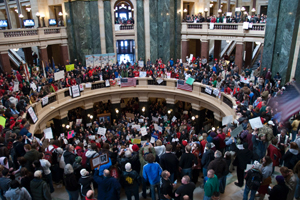Wisconsin Labor Jams Capitol To Resist Governor’s Attacks

Wisconsin’s new Republican governor inadvertently issued a wake-up call to the state’s labor movement by announcing legislation February 11 that would crush public employee unions.
Scott Walker made the proposals just two days after similar measures were unveiled in Ohio.
Wisconsin’s labor movement and allies mobilized three days of emergency rallies in Madison, the state capital, ahead of an expected vote in the legislature February 17. Thirty thousand drumming, chanting protesters descended on the Capitol February 16. Some made plans to camp out there that night.
Building trades members planned to set up a grilling operation to feed bratwurst to workers and students there.
Madison schools had closed that day when about half the teachers called in sick. About 800 Madison high school students walked out of class and marched to join protests. University of Wisconsin students, who had planned an action around university funding, turned instead to workers’ rights and brought an estimated 1,000 protesters to the Capitol.
A thousand teachers and supporters stopped traffic as they walked from Wisconsin AFL-CIO headquarters to Walker’s house near Milwaukee. Two hundred protesters turned out when the governor spoke in Eau Claire.
A massive phonebanking and door-knocking campaign urged voters to contact the more moderate Republicans in the state senate. In the face of such massive resistance, Republican legislators signaled a willingness to back off late Wednesday.
A PART OF HISTORY
Jim Cavanaugh, president of Madison’s 90,000-member South Central Federation of Labor, described an outpouring of solidarity. An AFL-CIO news conference brought private sector union leaders to declare their support for embattled public employee unions.
In an email, Dave Poklinkoski, president of a utility workers local, said, “The breadth and depth of the solidarity at these rallies is beyond anything witnessed in Madison in living memory.” He invited friends to come “be a part of history.”

SUPPORT LABOR NOTES
BECOME A MONTHLY DONOR
Give $10 a month or more and get our "Fight the Boss, Build the Union" T-shirt.
Walker would eliminate collective bargaining for public employees on all matters except wages. Any wage increase surpassing the consumer price index would have to be approved by voters. His plan calls for state employees to contribute much more to their pensions and health insurance costs—the equivalent of an 8 percent pay cut.
For good measure, Walker added that he had briefed the National Guard, so it would be ready to address any potential disruption of services caused by union protests. A veterans group slammed the governor, asking if he understood the military is not a “personal intimidation force to be mobilized to quash political dissent.” A spokesman later said soldiers would only replace prison guards.
Police and firefighter unions would be exempt from the new law. Both of Milwaukee’s uniformed unions endorsed Walker’s gubernatorial bid last year, leaving other unionists in the state muttering about backroom deals. But firefighters, to great applause, joined the throngs descending on the Capitol.
‘BUDGET REPAIR’
Walker is selling his anti-bargaining proposal as part of a “Budget Repair Bill” aimed at addressing the state’s immediate $136 million deficit as well as a larger deficit of $3.6 billion projected for the next two-year budget cycle. He says his proposals on health and pension contributions would save $30 million and help avert wide layoffs of state employees.
But AFSCME Council 24 points out that state employees have already sacrificed for years, taking unpaid furlough days and heavier workloads. Late last year, they offered a contract containing $100 million in concessions—an offer legislators rejected and the governor ignores.
The Economic Policy Institute think-tank said Wisconsin public employees actually earn 5 percent less in wages and benefits than private-sector counterparts, when workers with similar experience and education levels are compared.
Much of the governor’s proposal does not concern the state budget at all, but serves to cripple public employee unions. It would prohibit collecting member dues through payroll deductions and end any requirement that employees pay union dues at all. It would require union bargaining units to hold an annual certification vote in order to maintain representation.
Cavanaugh believes Walker may have overreached politically and that, assuming the immediate threat can be turned back, the labor movement can reap benefits.
“We’re getting a lot of people off their butts, seeing what these right-wing fanatics are capable of,” he said. “We’re achieving more union solidarity than we’ve seen in a long time.”





Comments
I continue to be
I continue to be astounded--and inspired--hopefully here begins the fightback.
Wisconsin
I think that another crucial way to help the struggle is to spread it to other states. In New Jersey, where I live, there are beginning to be efforts to do this against attacks on state workers here.
ALF-CIO
I got an email from the AFL-CIO online organizing coordinator about Wisconsin, suggested voicing support on Facebook.
I suggested instead the AFL call for putting our bodies at entry points into Wisconsin and stopping freight.
Nobody wins anything sitting at a computer.
David McCullough
The Whole World is Watching
I'm a retired Steelworker stuck in Alabama but I'm keeping up with Madison as best i can. Al Jazeera has been carrying the Madison protests in their worldwide coverage. Workers around the world are rooting for you. Thanks.